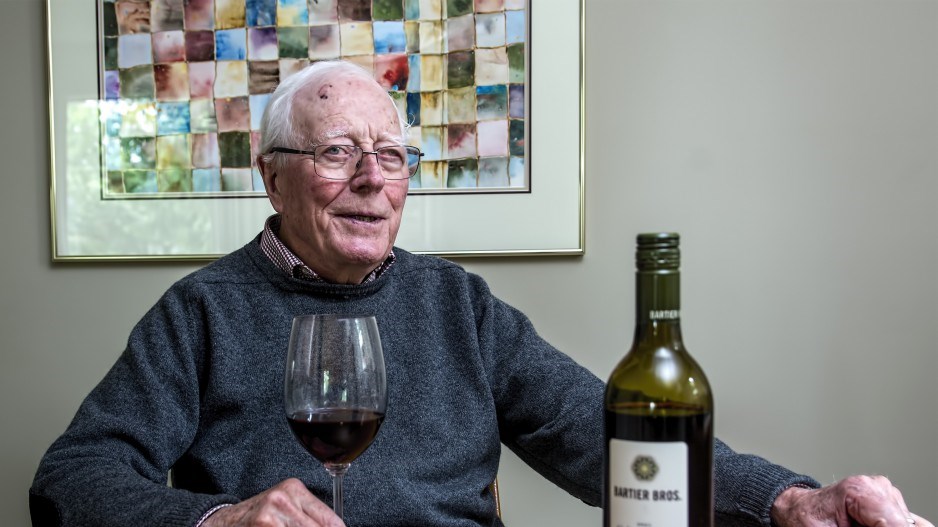B.C.'s wine sector is in recovery mode following a deep winter freeze in late 2022 that forced winery owners to slash 2023 production and fear that future winter deep freezes could threaten operations.
Wine Growers British Columbia (WGBC) estimates 29 per cent of the industry’s 12,681 acres of grapes suffered damage from a deep freeze in December 2022.
Temperatures remained below -20 C for many days in most parts of B.C.’s Interior and they reached as low as -30 C in Kelowna, West Kelowna and the Shuswap region.
Another deep freeze is expected this week.
"In total, between 3,814 and 7,492 acres need to be replanted in B.C.," the WGBC said in a recent news release. "Average re-establishment cost per acre is $42,360."
That financial hit is why the WGBC is asking the provincial government to provide between $162 million and $317 million to help the industry replant vines.
"I don't think there's a hope in hell that they're going to get that kind of money out of government," wine author and close follower of the B.C. wine sector John Schreiner told BIV.
"The good news is that the quality of the 2023 vintage is pretty good, but one of the bits of bad news is that many are expecting only half of the normal supply."
Hardest hit are winery owners whose vineyards included Syrah, Cabarnet Sauvignon and Malbec grapes – many of which saw vines killed. Schreiner mentioned Vanessa Vineyard as being one of the ones that suffered substantial vine damage.
"B.C. doesn’t have a lot of Malbec but we did have a fair amount of Syrah," Schreiner said. "The Syrahs from the Okanagan have been quite good so that's a serious loss."
Vineyards that produced other grape varieties in many instances suffered bud damage, not vine death.
Schreiner said the bud damage is likely to crimp production for a year or two but that the vines would be likely to return to full production after that.
A separate phenomenon Schreiner has noticed is that more B.C. wineries are for sale than was the case years ago.
Play Estate Winery, for example, went up for sale in December.
"Some of those for sale have adjusted their asking prices, but Seven Stones Winery has been for sale for an elevated price for about three years," Schreiner said.
"Real estate prices in the Okanagan are as ridiculous as they are here, so that is part of what is driving [the increase in wineries being for sale.]"
Some of those who have large vineyard holdings, such as Mission Hill Family Estate Winery owner Anthony von Mandl, and Frind Estate Winery owner Markus Frind have been adding to their real estate portfolios.
Solvero Winery principal Alison Moyes told BIV that her winery suffered bud damage and that she is optimistic that full production for her Pinot Noir, Chardonnay, Gamay and Pinot Gris can resume in 2024.
"Last year's harvest was quite a high-yielding harvest," she said. "It was a very late harvest, followed very quickly by extremely cold temperatures. That is the exact combination of variables that vines do not like as it doesn't give them time to acclimatize for the winter.”
This year, she said, she is seeing the opposite. “We had a lighter yield that was high quality,” she said. “It was also an early harvest – the earliest one I've done in my 15 years here."
Moyes said her boutique winery is small enough that attending events, such as the large Vancouver International Wine Festival in March, can be too expensive to justify.
Instead, she is set to be one of approximately seven B.C. wineries that are attending the three-night Top Drop Terroir + Craft festival at the Roundhouse Community Centre in mid-May.
Organizer Kurtis Kolt told BIV that his annual festival launched in 2014, includes more than 40 wineries from around the world, and can accommodate about 200 people per night.
"We want to see producers that aren't often in our market," Kolt said.
"We insist that principals are in attendance, so that would be a winemaker or someone from the vineyard, or the owner. We also want wineries that are adhering to our philosophy, which is sustainability and to have thoughtful wines."




